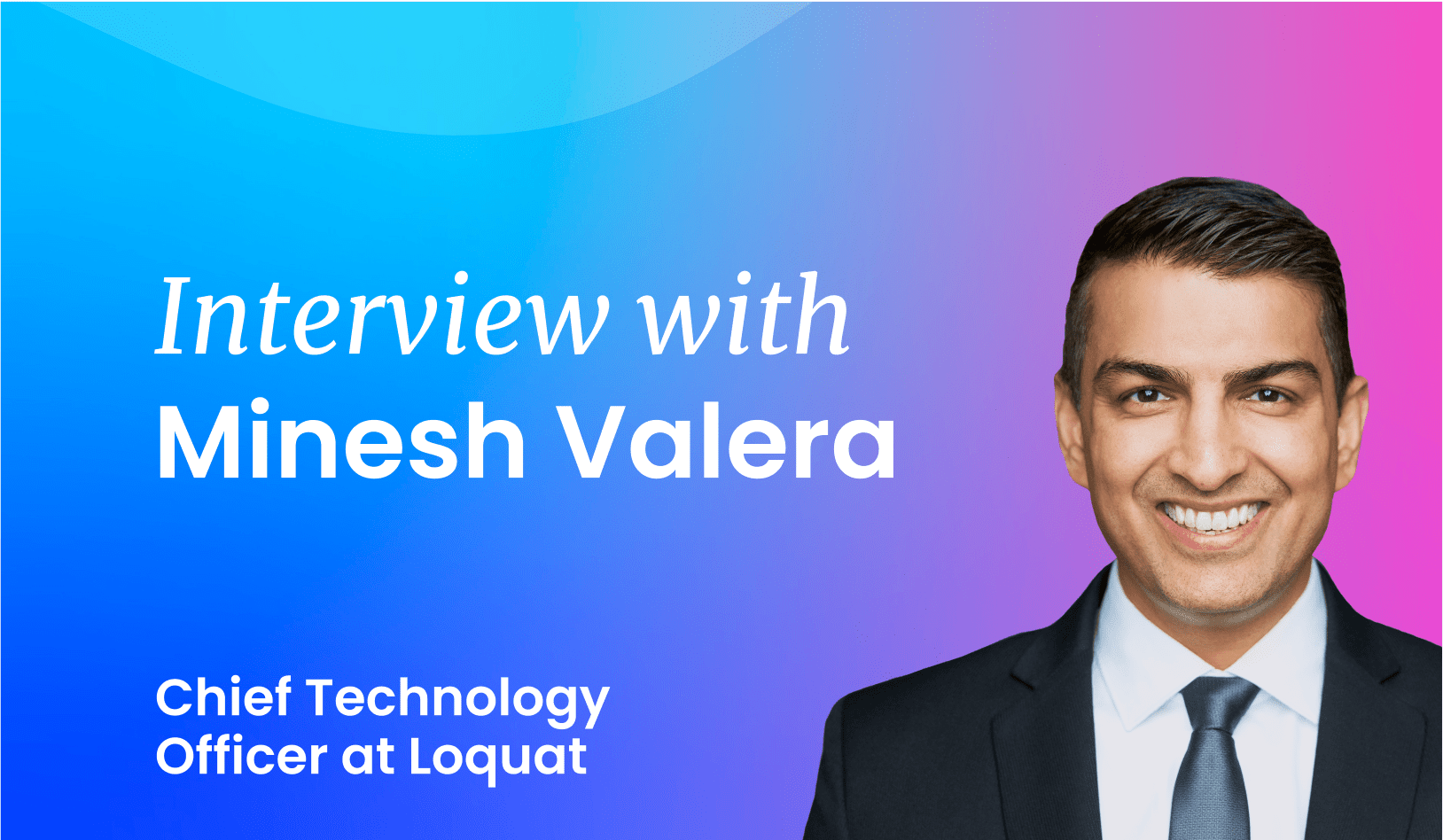Loquat Executive Interview with Chief Technology Officer Minesh Valera
Welcome to the second installment of the Loquat Executive Interview Series where we will be diving deep into topics related to the state of Fintech, digital transformation in banking, Banking-as-a-Service, Security and compliance in banking. This interview series aims to share value with our clients and investors by showcasing the knowledge, perspectives, and thought leadership of the Loquat executive team as well as the Loquat story.
Question: Minesh, please tell us about you, your background and how you joined the Loquat team.
I have a long history in the financial services industry working with various institutions of all sizes with a focus on improving operational efficiency through digital technology.
I’ve led small and large financial teams where we analyze emerging technologies to identify ways we can leverage them to enhance existing processes. For example, at BNY Mellon I was brought on board to lead and build their digital transformation journey with an emphasis on improving the customer experience for existing and future clients.
I joined Loquat because I believe in the Loquat mission and Zarina, the CEO’s vision – to break down barriers to financial access for SMB’s so they have a fair chance of securing a loan or opening an account. Loquat believes in the local roots of communities and that SMB’s are the backbone of society.
We want to remove the stigma in the financial space when it comes to individuals who may not have the best credit score and it is hindering them from growing their business.
Loquat also partners with the best providers in the industry – which means we don’t cut corners regarding security, AML identity verification, and fraud detection. Our team is primarily made up of former banking executives so we know what it means to prioritize security along with speed, transparency, and efficiency.
Question: Can you tell us about how the Loquat technology works, while of course keeping the proprietary components private?
From a technological perspective, Loquat is built on three pillars with the first one being transparency. Our platform is designed to provide clear information directly to financial institutions and the SMB members. Whether it’s transparency in the information being collected – we always explain why we’re doing what we’re doing.
The second pillar is regulatory and compliance. When you take a look at some of the statistics in the industry – it is alarming. And many of the competing platforms out there do not have the same regulatory and compliance measures in place that we do. We have a CCO on our team that ensures we meet and stay up to date on all requirements.
For example, processing of PII information, processing of sensitive documents, all that information needs to be thought through from the regulatory and compliance perspective.
The third pillar that Loquat focuses on is that we’ve picked the best of the breed when it comes to technology partners. We’ve spent a significant amount of time looking at the products that are out there in the market.
We’ve done our due diligence to ensure that the partners we choose reflect similar values as Loquat from an ESG perspective. In addition, we want to ensure that it provides stability, scalability and customization for the clients.
Question: How does this benefit FI’s such as credit unions and what are some of the key differentiators that competitors aren’t considering?
So what Loquat guarantees is that the due diligence we’ve done upfront with regard to regulatory and compliance, we’ve streamlined the operational flow, for example – opening an account. We looked at everything that is required and digitized the existing platforms an FI has.
With the KYC process we ensure that we’re capturing critical information in collaboration with our technology partners and our Chief Compliance Officer as well as regulatory compliance in order for us to provide a streamlined journey for FI’s and small business members. Our proprietary flow is designed with the end user in mind.
Question: Fraud and security breaches are a big concern for banks in digital transformation. How would you reply to that concern?
As digital transformation happens in this space, the risk of financial fraud will continue to increase. And to mitigate that, the thought process is that you’re not going to be able to guarantee 100% prevention of threats, but Loquat offers six different layers of checks and balances that we built within the platform itself. We are significantly reducing the possibility of financial fraud that a financial institution will face, whether digital or not. That’s where the regulatory and compliance component comes in – we want to ensure that the information you’re providing is safe, that the information we’re collecting is thoroughly validated and authenticated so that the financial institutions are not taking on any additional risk with the information that you’re providing and stays confidential and private to the member.
Question: Would you say there’s any other benefits that FI’s can expect? I know that one of the top benefits is that the Loquat platform can increase operational efficiency up to 75%. That is revolutionary. Can you expand on that?
In comparison to what we’ve seen in the industry – we looked at the process from its origination. So, we review what is currently being done and then analyze how to make it even better. That’s how we offer optimal efficiency.
The Loquat platform is also system record agnostic so we can integrate with any existing platform, as well as an independent product or solution.
Through the usage of proprietary API’s that we built with subject matter experts on the Loquat team. We are able to identify weak points and make them more efficient and enhance the digital journey for the end user.
One of the biggest areas that is impacting credit unions and community banks is competition with the large banking institutions. What the smaller, local institutions need to focus on now is driving that customer loyalty with technology. Otherwise, your members are going to go somewhere else for a faster, efficient and convenient customer experience – it’s already happening.
So that’s exactly where Loquat comes in, we’re not just looking at what is currently being done, but let’s figure out how we can do it better. So that internally, we’re not compromising on any controls that exist within financial institutions. But at the same time, we want to make sure that we provide that slim, transparent, easy-to-use digital experience for your customers as well.
Question: What is the Loquat vision for the future? And the reason I kind of bring that up is because another great benefit of BaaS is that it has the ability to be customizable. It has the ability to evolve and adapt with not only the end user, which is a small business. It adapts to their needs, but it will also adapt and evolve with the financial institution as well.
In addition to what you just mentioned, is time to market for financial institutions. Loquat has simplified the process for the financial institution, where through a simple integration with Loquat, they’re able to take advantage of all the platform has to offer. And then I think the second component that you mentioned is the ability to scale as well, for financial institutions.
The Loquat platform is extremely flexible. It is able to scale with financial institutions at the speed that they prefer. So, if they want to go to 20 markets all at once, or they want to go to 200 markets all at once, the Loquat platform is capable and scalable to be able to accommodate that which is huge in the digital era of competition. Our vision is to continue to remove barriers for SMB’s by helping FI’s scale beyond what they think is possible with the help of digital technology.
Ready to learn how Loquat can help your financial institution? Let us show you how it works!
You can also learn more about the Loquat Executive Team and connect with our CTO Minesh Valera on LinkedIn.





